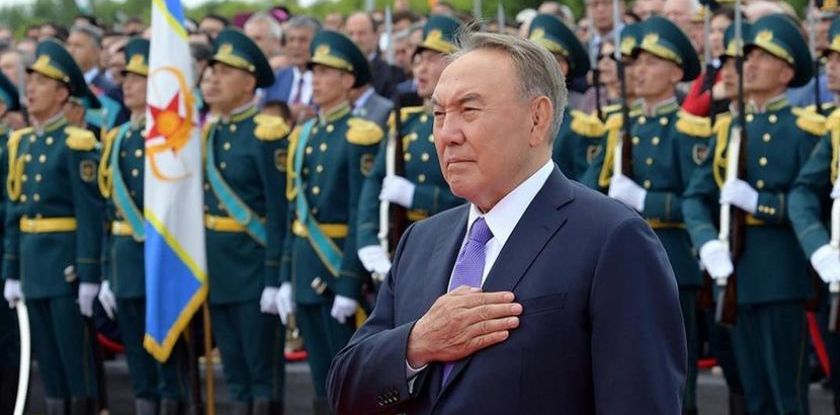With this chapter, we are concluded the publication of the essay Nursultan Nazarbaev. Stages of career, system if interests and political power” written in 2005 by Kazakhstani scientist, history PhD, professor Nurbolat Masanov for the activists of the civil society that wasn’t published earlier.
Read the previous articles by following link: Nursultran Nazarbaev: consolidation of power, Nursultan Nazarbaev: career, interests, power, Nursultan Nazarbaev: ascension to the top, Nursultan Nazarbaev: a focus on ethncoracy, Nursultan Nazarbaev: elimination of opponents, Nazarbaev: consolidation of elites.
In some ways this might be a subjective view on the personality of the first president of the country, but nonetheless, one deserving of attention of all those interested in the history of Kazakhstan…

Nursultan Nazarbaev: conclusion
Nursultan Nazarbaev is one of those politicians for whom concepts of “Us, people, nation, or state never had any meaning outside of the populist rhetoric, political toolbox and personal interests. It is natural for him to associate himself with the government, Republic of Kazakhstan, interests of the Kazakh ethnos, concepts of stability and interethnic harmony formed by him. This is regardless of how they align with political reality.
This is why, in his activity, Nazarbaev inserts system of personal interest into system of political interest. Most obvious example of this is the currently acting constitution of 1995. According to article 47 clause 2 president is relieved of responsibility for his actions, while in office as a president.
Fearing political competition, he got rid of the positon of vice-president of the country and the institute of constitutional court.
The most cynical example of his understanding of the mechanisms of political functioning of government institutions of power is the creation of her personal political party Asar, by his daughter (Dariga) and her appointment as head of the largest government media holding.
Overall, hiring policy of the president mostly demonstrates his political selfishness. Appointment of son-in-law of Rahat Aliev to key positions as head of government customs, tax police, committee of security and now as minister of foreign affaires’ speak of the fact that for him it is natural to advance to highest positions of power people, affiliated with him by familial ties.
Appointment of Timur Kulibaev to managing positions in Kazakhoil, KazTransGas, KazMunaiGaz, activity of Sara Nazarbaeva at her position as the head of children’s fund Bobek, transfer of historically significant house of House of parliament, in the center of Almaty for the use of Kazakh-British technical university, belonging to second daughter Dinara Kulibaeva, should be viewed in the same context.
Nazarbaev lacks the understanding that his closest relatives shouldn’t take government or state position appointment to which depends directly on him. Yes, as Kazakhstani citizens they have a right to participate in government activity, but only in the sphere not directly dependent on the president. In this regard Nazarbaev lacks any principles, and as a regular Soviet bureaucrat participates in nepotism and direct lobbying of those close to him.
Moreover, Nazarbaev thinks that as a president of the country he has to do this directly and has direct right to protect and display clan-familial interests through the position occupied by him. This is clearly evidenced not only by his hiring policy but by the activity of the construction company Elitstroy belonging to his younger daughter Aliya, which ruins the historical look of the city with its unrestrained building scope, and brings direct harm to interests of the citizens, pushing them out of their space of traditional habitation.
Aside from that, Nazarbaev truly believes in his historical mission and moreover inspires it to everyone around him, propagates it, and creates corresponding mythology; he thinks that he is the creator of the first Kazakh state, and a guarantor of inter-ethnic harmony and a creator of an economic miracle.
In analysts’ opinion, Nazarbaev lacks a clearly displayed natural charisma, it is partially displayed only in the environment of weak, paralyzed and dependent entourage of his. Work in the party circles and working class, farming past formed in him an acquired charisma. Such charisma is evident and subtle.
He knows how to manipulate people, judging from the fact that there are three types of people:
- those for whom personal interest is above all else.
There are active and passive ones. These people are typologically close to Nazarbaev himself – he speaks the same language as them. He is just trying to find out strong and weak sides of this type of people, their interests and just buys them out and puts them on a type of a counter. But the case of Muhtar Ablyazov, Bulat Abilov and others shows that among active ones, there are plenty of people dangerous for the president. They are too ambitious, and their personal interests may not align with president’s coordinate system. Thus being able to understand them, up to a certain time, Nazarbaev tried to keep a reign on them, but in recent times he changed. Thus, it is becoming harder for him to agree with them.
- The second type is people who put some principles or ideals in the first place.
In Nazarbaev’s understaning such group of people must simply be utilized through the use of concept of statists, or conversely he completely ignores it, if there is no way to utilize them on practice. This people are potentially dangerous with a tendency to gradually get out of control.
- And a third type – swamp – people without interests or ideals.
They don’t need to be taken into account. They can easily be used as a crowd.
Note from editorial staff: We address your attention to the fact that this essay wasn’t finished due to a tragic deth of the author, and encompasses the period until the end of 2005.




